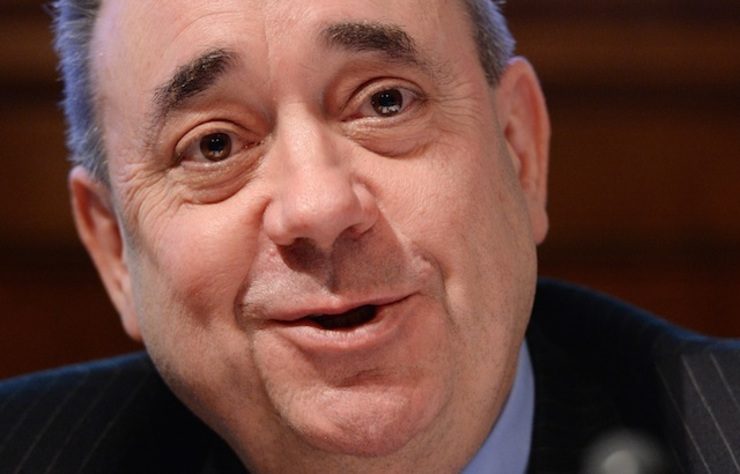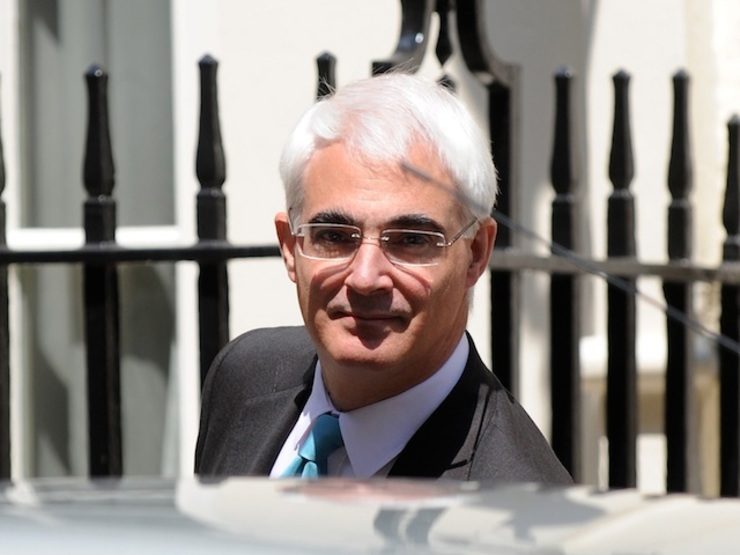SUMMARY
This is AI generated summarization, which may have errors. For context, always refer to the full article.

LONDON, United Kingdom – Scotland’s independence referendum campaign hots up on Tuesday, August 5, when the leaders of the ‘Yes’ and ‘No’ camps go head-to-head in their first live TV debate.
First Minister Alex Salmond, who is leading calls for Scotland to split from Britain, will face Alistair Darling, Britain’s former finance minister who helped steer the country through the 2008 economic crisis.
With the anti-independence camp leading in opinion polls ahead of the vote on September 18, Salmond will be seeking a clear win against Darling to give his side a shot in the arm.
The two men’s styles could hardly be more different.
Salmond is a master of the soundbite once nicknamed “smart Alex” for his ability to score quick points off rivals, who has smoothed off some of his combative edge as Scotland’s leader.
He has predicted Darling would “have the heebie jeebies” about facing him.
His opponent is a former lawyer known for his calm manner, technocratic approach to politics and dry wit.
“When it comes to rhetoric, he (Darling) has all the power of a bowl of custard whereas Salmond is like a nuclear bomb,” Simon Lancaster, a senior British government speechwriter under Tony Blair, who now runs a business writing speeches for CEOs, told Agence France-Presse.
‘Yes’ camp seeks boost
The debate in Glasgow comes six weeks before Scots go to the polls on whether to break up the union with England, Wales and Northern Ireland, which dates back just over 300 years.
Despite Salmond’s confidence, most opinion polls give the pro-union camp 45-50% of the vote and put the pro-independence side in the mid to high 30s.
The remainder of voters are still undecided, according to the British Election Study academic research group.

Much debate in the campaign has centered on whether or not Scotland’s economy can afford to go it alone.
Experts say it is voters who have already made up their minds how to vote rather than the undecideds who are most likely to watch the debate.
But a strong performance by Salmond, the leader of the Scottish National Party (SNP), could still provide a timely boost for the Yes campaign in the final weeks of campaigning.
“‘Yes’ are behind. This is a major event,” said John Curtice, a professor at Glasgow’s Strathclyde University and a leading commentator on Scottish politics.
“It looks as if the ‘Yes’ have not made much headway for three or four months. They still need to make more progress. This looks like a pretty good opportunity to do so.”
Salmond’s team have so far agreed to only one televised debate, despite an offer from the BBC to host another one.
He had originally hoped to debate with Conservative Prime Minister David Cameron – whose center-right politics and privileged education at Eton College and Oxford University play badly with many Scots.
But Cameron refused, saying independence was a matter for Scots to decide.
Social media is likely to play a key role in how voters perceive the debate, with host TV channel STV encouraging viewers to join in on Twitter, Facebook and Google+.
Experts say many people are likely to watch the debate on TV at home with a smartphone or tablet in their hand.
“The big thing is the real-time reach,” said John McTernan, a political strategist and former senior adviser to the Labour Party, which is campaigning for a ‘No’ vote.
“Social media is very powerful in influencing not because it changes your mind but it lets you know what your friends and family are thinking.”
Pro-independence campaigners – nicknamed “cybernats” by political rivals – have been particularly vocal on Twitter in recent months through a series of slick and well-coordinated feeds.
And the SNP is encouraging supporters to host a “debate night social” for family, friends and colleagues.
Instant impressions of who has won the debate are likely to be available thanks to the election “worm” used by pollsters to track viewers’ sentiments almost instantaneously during debates.
But Curtice indicated it could be a week before the impact of the debate, if any, filters through to opinion polls. – Rappler.com
Add a comment
How does this make you feel?
There are no comments yet. Add your comment to start the conversation.